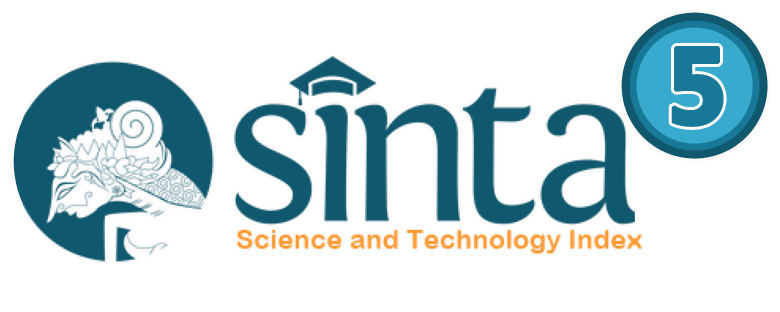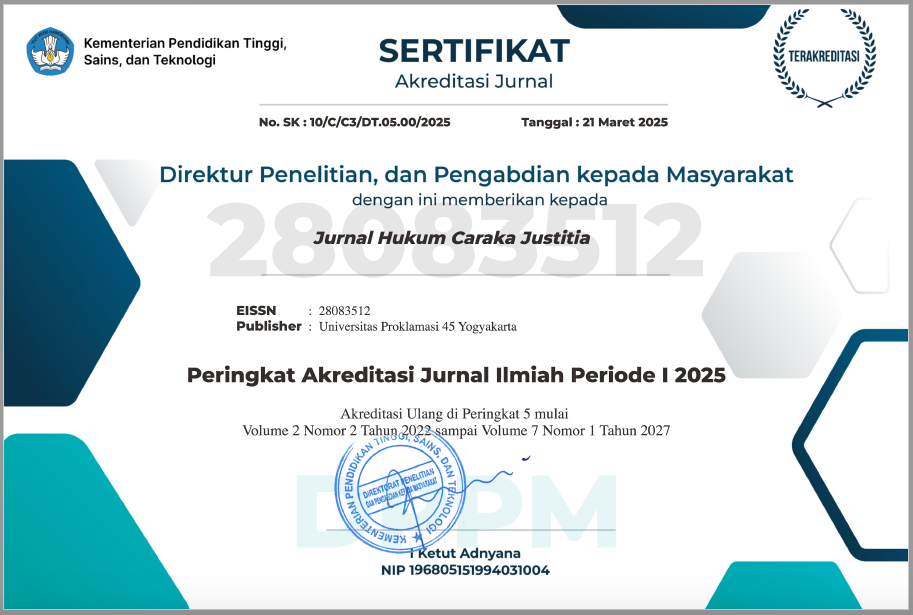Prinsip Deklaratif Sebagai Wujud Perlindungan Hukum Bagi Pemegang Hak Cipta Atas Ciptaan Sketsa Tugu Selamat Datang di Jakarta
Studi Kasus Putusan Nomor 35/Pdt.Sus-Hak Cipta/2020/PN Niaga Jkt.Ps
DOI:
https://doi.org/10.30588/jhcj.v4i1.1838Keywords:
Declarative Principle, Copyright Holder, Legal Protection.Abstract
The research aims to determine and analyze the resolution of copyright holder disputes over creative works of sketches of the welcome monument in Jakarta based on declarative principles based on Indonesian positive law. The research method uses normative juridical research. This type of research is intended as a type of dogmatic (doctrinal) research and a form of descriptive research about laws. The approach to this research is a statutory approach and a case approach related to the application of the declarative principle for the copyright holder of a creative work, Sketsa Tugu Selamat Datang, against other parties who use the sketch's copyrighted work, without the permission of the copyright holder, such as in cases of copyright infringement. sketch of the welcome monument registered in case Decision Number: 35/Pdt.Sus-Hak Copyright/2020/PN Niaga Jkt.Ps).
The results of this research are a form of legal protection for copyright holders for the Selamat Datang Monument Sketch, namely that the copyright holder has received automatic rights protection (declarative principle) if a work has been created or realized, and has received recognition from the state even though the work has not been registered or published. As well as providing legal protection for moral rights, economic rights (royalties), and rights related to copyright holders. These aspects have characteristics that must be carried out to be fulfilled in law enforcement. Another form of legal protection is a judge's decision that punishes PT. Grand Indonesia (defendant) to pay for material losses suffered by Seana Meaya Nunjung and other heirs (plaintiffs) due to the use of the PT Logo. Grand Indonesia, which is paid in full and at once after the verdict in this case, has permanent legal force.
References
Artikel Jurnal
Anis, Mashdurohatun. “Problematika Perlindungan Hak Cipta di Indonesia”. Yustisia Jurnal Hukum 1, no. 1 (Januari 2012): 71-89. https://doi.org/10.20961/yustisia.v1i1.10600.
Fidhayanti, Dwi & Moh. Ainul Yaqin. “Penerapan Prinsip Deklaratif Dalam Pendaftaran Hak Cipta Oleh Direktorat Jenderal Kekayaan Intelektual (Studi di Kantor Wilayah Kementerian Hukum dan Hak Asasi Manusia Jawa Timur)”, Perspektif: Kajian Masalah Hukum dan Pembangunan 28, no. 2 (Mei 2023): 94-109. http://www.jurnal-perspektif.org/index.php/perspektif/article/view/856.
Purba, Claudia Ersa. “Implementasi Kriteria Tempat Perdagangan Menurut Pasal 10 Undang-Undang Nomor 28 Tahun 2008 tentang Hak Cipta Terhadap Pelanggaran Hak Cipta Di Pusat Perbelanjaan”. E-Journal Universitas Atma Jaya Yogyakarta 2, no. 1 (Juni 2016): 1-13. http://e-journal.uajy.ac.id/10569/1/JurnalHK11053.pdf.
Siti, Hatikasari. “Esensi Perlindungan Hukum Dalam Sistem First To Announce Atas Karya Cipta”. Supremasi Hukum: Jurnal Penelitian Hukum 27, no. 2 (Agustus 2018): 118-132. https://doi.org/10.33369/jsh.27.2.118-132.
Buku
Badrulzaman, Miriam Darus. Mencari Sistem Hukum Benda Nasional. Bandung: BPHN-Alumni, 1983.
Dharmawan, Supasti, Ni Ketut, et. al. Harmonisasi Hukum Kekayaan Intelektual Indonesia. Bali: Swasta Nulus, 2018.
Djumhana, Muhammad & Djubaedillah, R. Hak Milik Intelektual, Sejarah, Teori dan Prakteknya di Indonesia, Edisi Revisi, Cetakan ke-3. Bandung: Citra Aditya Bakti, 2003.
Efendi, Jonaedi, & Johny Ibrahim. Metode Peneltian Hukum Normatif dan Empiris, 1th edn, Jakarta: Prenadamedia Group, 2016.
Fajar, Mukti, & Achmad Yulianto. Dualisme Penelitian Hukum. Yogyakarta: Fakultas Hukum Universitas Muhammadiyah Yogyakarta, 2007.
Firmansyah, Muhammad. Tata Cara Mengurus HAKI. Jakarta: Visi Media, 2008.
Marzuki, Peter Mahmud. Penelitian Hukum. Jakarta: Prenadamedia Group, 2016.
Purba, Acmad Zen. Hak Kekayaan Intelektual Pasca Trips. Bandung: Alumni, 2011.
Ramadhan, M. Citra, et.al. Buku Ajar Hak Kekayaan Intelektual. Deliserdang: Universitas Medan Area Press, 2023.
Rumani, Sri. Tinjauan Yuridis Pelaksanaan Hak Cipta Dalam Open Access Informasi. Yogyakarta: Universitas Gadjah Mada, 2016.
Saidi, Ok. Aspek Hukum Hak Kekayaan Intelektual (Intellectual Property Rights) Cetakan Ke-4. Jakarta: PT. Raja Grafindo Persada, 2004.
Soekanto, Soerjono. Pengantar Penelitian Hukum. Jakarta: UI-Press, 2007.
Sunggono, Bambang. Metodologi Penelitian Hukum. Depok: Rajawali Pers, 2003.
Susanti, Dyah O. & A’an Efendi. Penelitian Hukum (Legal Reseacrh). Jakarta: Sinar Grafika, 2015.
Bahan Penataran
Kesowo, Bambang. “Pengantar Hukum Mengenai Hak Atas Kekayaan Intelektual (HKI) di Indonesia”. Bahan Penataran Dosen Hukum Dagang Se-Indonesia, Fakultas Hukum UGM, 1995.
Internet
Ajebi, Amarullahi. “Kronologis Sengketa Hak Cipta Sketsa Tugu Selamat Datang Yang Dipakai Oleh Mall Grand Indonesia”. https://pdb-lawfirm.id/kronologis-sengketa-hak-cipta-sketsa-tugu-selamat-datang-yang-dipakai-oleh-mall-grand-indonesia/ (diakses 3 September 2023).
Cek HKI. “Mengenal Prinsip Deklaratif Dalam Hak Cipta”. https://cekhki.id/mengenal-prinsip-deklaratif-dalam-hak-cipta/- (diakses 31 Mei 2023).
Mariska. “Kronologi Mal Grand Indonesia Denda 1 Miliar Akibat Hak Cipta”. https://kontrakhukum.com/article/hak-cipta-mal-grand-indonesia/- (diakses 3 September 2023).
WIPO. “What is Intellectual Property?” https://www.wipo.int/about-ip/en/ (diakses 1 Januari 2024).
Downloads
Published
How to Cite
Issue
Section
License
Copyright (c) 2024 Sigit Wibowo

This work is licensed under a Creative Commons Attribution 4.0 International License.
Authors who publish with JHCJ agree to the following terms:
Authors retain copyright and grant the JHCJ right of first publication with the work simultaneously licensed under a Creative Commons Attribution 4.0 International License that allows others to share (copy and redistribute the material in any medium or format) and adapt (remix, transform, and build upon the material) the work for any purpose, even commercially with an acknowledgment of the work's authorship and initial publication in JHCJ.
Authors are able to enter into separate, additional contractual arrangements for the non-exclusive distribution of the journal's published version of the work (e.g., post it to an institutional repository or publish it in a book), with an acknowledgment of its initial publication in JHCJ. Authors are permitted and encouraged to post their work online (e.g., in institutional repositories or on their website) prior to and during the submission process, as it can lead to productive exchanges, as well as earlier and greater citation of published work (See The Effect of Open Access).














